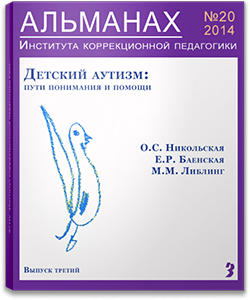Infantile Autism: the Ways of Understanding and Assistance
Almanac #20 · Issue #3 · 2014

The mutual shared activity-the way of the infantile therapy
The conception “the mutual shared activity” is introduced as the key one for the logic understanding of the content of special assistance in autism. The conception defines the source and the main driving force of the affective sphere formation in normal ontogenesis. There is described the succession of forming of ability to the mutual shared activity during the positive affective development. Displays of its deficiency in autism are analysed. The ways of overcoming this deficiency are laid, there are discussed the main forms of special correctional work directed at normalization of the psychical and social development of a child with autism.
Keywords
The mutual shared activity-the way of the infantile therapy
the mutual shared activitynormal ontogenesis
affective sphere formation
social development of a child with autism
The game in the infantile autism correction
The game is considered as the basic form of work with preschool children with autism, the primary one regarding to other activities. There is grounded understanding of the general direction of the gaming correction in autism as a movement “from autostimulation towards the mutual shared activity”. Methods of forming of the mutual shared activity during the game with the autistic child are described. There is shown in consecutive order the logic of the gaming correctional work, there are discussed the aims and goals of the each stage of the lessons.
Keywords
The game in the infantile autism correction
preschool children with autismthe mutual shared activity gaming correctional work
autostimulation
game with the autistic child
Anecdotal drawing in the special correctional work with the autistic children
The article considers the targets and the content of the anecdotal drawing, which is used in the psychological correction of the early infantile autism, there are analyzed its features with the work of the children, who have different types of autistic dysontogenesis, there are described consecutive stages and specific methods of the use of drawings.
Keywords
Anecdotal drawing in the special correctional work with the autistic children
anecdotal drawinguse of drawings
types of autistic dysontogenesis
early infantile autism
psychological correction
Psychological assistance for the child with autism during the reading process
Joint book reading is presented in the article as a tool of the psychological support to the child with developmental problems which supplements the possibilities of joint drawing and games. It’s shown that involvement of the autistic child in joint book reading can promote the child’s understanding, differentiation of the plot organization of the life experience, definition of events cause-effect relationship, building his own hierarchy of goals and wishes. There are discussed the possibilities of joint book reading in the fears correction of the child.
Keywords
Psychological assistance for the child with autism during the reading process
joint book readingchild with developmental problems
tool of the psychological support
hierarchy of goals and wishes
autistic child
fears correction of the child
Family upbringing of the child with autism
There are described the features of life organization in the family having an autistic child, there is considered the content of the special approach to the child’s upbringing which helps him to comprehend emotionally the life events, to develop the possibilities of arbitrary behavior and flexibility regarding the relationship with the environment. Particular emphasis is given to the regular emotional and sense comments of the events happening in the child’s life as a necessary form of special correctional work.
Keywords
Family upbringing of the child with autism
an autistic childspecial approach to the child’s upbringing
emotional and sense comments
arbitrary behavior
special correctional work
family upbringing
Ten arguments against ABA (Applied Behavioral Analysis) therapy
The article gives proof of the opinion concerning an inadequacy of ABA therapy as a basic method of infantile autism correction. There is discussed the disparity in the behavioral methods to the aim of the child development. The emphasis is laid on the necessity of gaming lessons with preschool autistic children and of creating of special conditions for their conscious learning social and everyday skills.
Keywords
Ten arguments against ABA (Applied Behavioral Analysis) therapy
ABA therapymethod of infantile autism correction
gaming lessons
preschool autistic children
conscious learning social and everyday skills